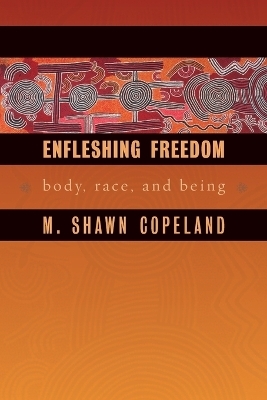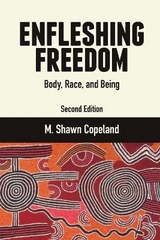
Enfleshing Freedom
Body, Race, and Being
Seiten
2009
Fortress Press,U.S. (Verlag)
978-0-8006-6274-5 (ISBN)
Fortress Press,U.S. (Verlag)
978-0-8006-6274-5 (ISBN)
- Titel erscheint in neuer Auflage
- Artikel merken
Zu diesem Artikel existiert eine Nachauflage
* Harvests insights of black women's historical experience for theology * Rethinks what it means to be human in light of African American experience
Being human is neither abstract nor hypothetical. It is concrete, visceral, and embodied in the everyday experience and relationships that determine who we are. In that case, argues distinguished theologian Shawn Copeland, we have much to learn from the embodied experience of Black women who, for centuries, have borne in their bodies the identities and pathologies of those in power.
With rare insight and conviction, Copeland demonstrates how Black women's experience and oppression cast a completely different light on our theological theorems and pious platitudes and reveal them as a kind of mental colonization that still operates powerfully in our economic and political configurations today. Further, Copeland argues, race and embodiment and relations of power not only reframe theological anthropology but also our notions of discipleship, church, and Christ as well. In fact, she argues, our postmodern situation marked decidedly by the realities of race, conflict, the remains of colonizing myths, and the health of bodies affords an opportunity to be human (and to be the body of Christ) with new clarity and effect.
Being human is neither abstract nor hypothetical. It is concrete, visceral, and embodied in the everyday experience and relationships that determine who we are. In that case, argues distinguished theologian Shawn Copeland, we have much to learn from the embodied experience of Black women who, for centuries, have borne in their bodies the identities and pathologies of those in power.
With rare insight and conviction, Copeland demonstrates how Black women's experience and oppression cast a completely different light on our theological theorems and pious platitudes and reveal them as a kind of mental colonization that still operates powerfully in our economic and political configurations today. Further, Copeland argues, race and embodiment and relations of power not only reframe theological anthropology but also our notions of discipleship, church, and Christ as well. In fact, she argues, our postmodern situation marked decidedly by the realities of race, conflict, the remains of colonizing myths, and the health of bodies affords an opportunity to be human (and to be the body of Christ) with new clarity and effect.
| Erscheint lt. Verlag | 9.10.2009 |
|---|---|
| Sprache | englisch |
| Maße | 140 x 215 mm |
| Themenwelt | Religion / Theologie ► Christentum ► Kirchengeschichte |
| ISBN-10 | 0-8006-6274-1 / 0800662741 |
| ISBN-13 | 978-0-8006-6274-5 / 9780800662745 |
| Zustand | Neuware |
| Haben Sie eine Frage zum Produkt? |
Mehr entdecken
aus dem Bereich
aus dem Bereich
von Athanasius bis Gregor dem Großen
Buch | Softcover (2024)
C.H.Beck (Verlag)
12,00 €
eine Geschichte der christlichen Kunst
Buch | Hardcover (2024)
C.H.Beck (Verlag)
32,00 €



